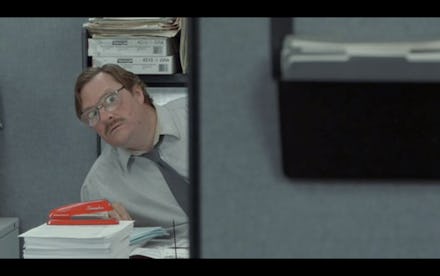What Working Long Hours Actually Does to Your Body

Get out of that office chair — before it kills you.
The 9-to-5 workweek has been a standard of American labor law for decades: It's the standard by which full employment is measured by the Bureau of Labor Statistics, by most economic indexes, even by Obamacare.
Unfortunately for American workers, the average employee's "40-hour workweek" is actually 47 hours, according to Gallup. It's even worse for salaried employees, most of whom aren't eligible for overtime pay. The average non-hourly American worker spends 49 hours per week at the office — with 1 in 4 reporting that they spend more than 60 hours per week at work. That's a 12-hour shift every day, Monday through Friday.
All of that extra work poses a serious risk to your health. Working long hours, even at a desk, can have serious repercussions for your physical and mental health and may even end up hurting productivity in the long run.
It's making you fatter. While seated, you burn 50 fewer calories per hour than while standing, a fact frequently pointed to by fans of the standing desk. Multiply that over a 47-hour workweek, and sitters will have had to run nearly 4 miles to burn off the extra 2,350 calories. Not to mention the 6 pounds gained every year from office snacks.
It's breaking your heart. Research has shown that those who spend four or more hours sitting per day have a 125% increase in heart disease risk, and a 50% increased risk of death from any cause.
"But my girlfriend's getting me into CrossFit and I'm trying these new kale shakes!" Nope. The study was controlled for diet and exercise, which means that even if you can grate cheese on your abs, a sedentary lifestyle will kill any health benefits you get from the gym.
It's giving you diabetes. The Australian Diabetes, Obesity and Lifestyle Study, a mammoth study cataloging the health and fitness habits of 12,000 Australians, found that people with the "highest sedentary behavior" had a 112% increase in their relative risk of Type 2 diabetes, and that was only with four hours of watching television per day. A similar study of more than 4,000 civil servants found that those who spend less than 12 hours sitting down a week can decrease their risk of diabetes by 75%, and that those who sit more than 25 hours per week increase the chance developing metabolic risk factors like "bad" cholesterol and insulin resistance.
It's making us depressed. According to researchers at University College in London, stressful work conditions, including long work hours, can double your risk of depression. A Gallup poll of nearly 240,000 full-time workers found that 10.8% of U.S. full-time workers have received a depression diagnosis. For employers, the truly damning result of the study was the calculation of how much depression costs them: roughly $23 billion a year.
It's stressing us out. According to the Attitudes in the American Workplace VII survey, 80% of workers feel stress on the job, and 25% have felt like screaming or shouting because of job stress; 14% even said that they had felt like striking a co-worker in the past year, but didn't. The United States has the highest workplace crime rate of any industrialized nation. According to the Occupational Health & Safety Administration, there are more than 500 workplace homicides every year. And all of that stress is taking a toll on our bodies, according to the Centers for Disease Control and Prevention: Perpetual stress "increases the rate of wear and tear to biological systems," contributing to back and muscle pain, headaches and exhaustion.
What do we blame? The Great Recession, for starters. As Mother Jones noted in its comprehensive defense of the 40-hour workweek, American economic output recovered to near pre-recession levels relatively quickly after the economic collapse of 2008. How? Because the workforce that was left was pulling out all the stops to avoid future layoffs, and that mad panic to stay employed has carried into the recovery. Employers couldn't be happier. After all, for every employee working a 50-hour week instead of a 40-hour week, they're getting 25% more work for the same stagnant pay. That's part of the reason unemployment has been so slow to fall as the economy has recovered: For every four Americans working a 50-hour week, there's one who should have a full-time job but doesn't.
Throw in the developed world's only country with unpaid parental leave, no federal laws regarding paid sick time and the fact that 70% of American kids live in homes where both parents now work, and it's no wonder the U.S. workforce is considered the most productive in the world, with a 400% increase in worker productivity since 1950.
Defenders of the increasingly interminable workweek point to the low-impact nature of the modern office environment compared with workplaces past. After all, white-collar office workers don't appear anywhere on the list of the nation's deadliest jobs. When's the last time filing a TPS report cost anybody a leg?
So what's the good news? As more studies are produced that conclude current work habits are going to lead America's workforce to an early grave, many workers are taking their health into their own hands, whether they're buying or making standing desks to mitigate 11 daily hours of sitting or negotiating nap-time policies with their bosses. Even just a brisk walk can reduce risk of deep-vein thrombosis.
Since, statistically, you're probably reading this at work, do yourself a favor: Go stretch your legs and grab a coffee. It might just save your life.